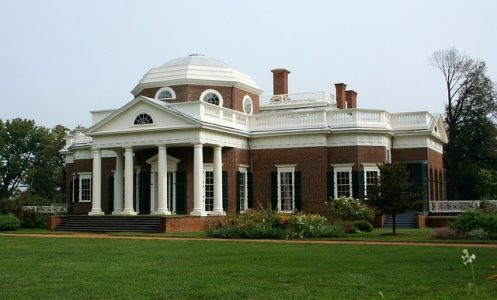Widgetized Section
Go to Admin » Appearance » Widgets » and move Gabfire Widget: Social into that MastheadOverlay zone
Leadership Lessons Learned as a Volunteer at Thomas Jefferson’s Monticello
The views expressed are those of the author and do not necessarily reflect the views of ASPA as an organization.
By Mike Abels
July 11, 202

Recently I completed volunteer service with Thomas Jefferson’s historic Monticello. This experience taught me lessons that I believe add value to our quest to build a more effective, democratic, humane and equitable society. Following are several lessons I learned:
Apply History to Today’s Issues
Our historic landmarks define who we are as a nation, both the positive and negative. The lives of those who inhabited our historic spaces like Monticello have been foundational in molding our political system, our culture and our values system. By studying our historical ancestors, we can observe lessons that can be applied to the challenges which confront us today. Through understanding their lives, we can learn lessons that may be communicated through stories to our fellow citizens for the purpose of addressing our society’s challenges and opportunities.
An example of historical relevance would be the relationship between Thomas Jefferson and John Adams. During the creation of the Declaration of Independence these two Founders were the best of friends and allies. They served together in the creation of the Declaration of Independence and were compatriots as American ministers to Europe. However, after the ratification of the Constitution they devolved into bitter political enemies. Fellow founder Benjamin Rush realized the importance of both Jefferson and Adams to our republic and struggled to reconcile these founders to the union they once shared. Rush was successful, leading to a renewed bonding between the two old patriots as demonstrated by several years of intimate letters between the two. Fascinatingly, their final act of brotherhood occurred the day they both died, July 4, 1826, with the last words uttered by Adams being, “Thomas Jefferson survives.” Can each of us serve as a Benjamin Rush by striving to unite our warring leaders? Can we share stories learned from our historical sites, with the goal of centering all citizens on preserving our democratic republic?
Stories about those who inhabited our historical sites are plentiful and provide lessons we can use to address current issues of our day. Examples of historical stories applied to today’s issues may be found in columns written for this media here and here.
Servant Leadership
As a volunteer at Monticello, I observed employees exhibiting a high degree of initiative and dedication to mission. Because my service coincided with the COVID pandemic, a time when Monticello was experiencing extreme financial stress, I was struck by the excellent employee motivation and questioned why? While empirical, I concluded that the high employee motivation resulted from the Monticello leadership employing the principles of adaptive servant leadership. As the pandemic raged in early 2020, with closure of Monticello looking imminent, the estate’s leadership assured staff that everyone would keep their jobs and benefits, fulfilling this promise by approving a seven-figure budget deficit for 2021.
At a time when traditional management theory would dictate reducing staff and salaries, Monticello’s leadership insured their most important asset was protected. In recognition of Monticello’s dedication, staff gave to Monticello a return on its investment through their initiative, positive attitude and dedication.
During this time of external threat, I witnessed Monticello employ innovative management initiatives that contributed to organizational success. These included moving in-person educational programming to an external web-based platform, and taking risks by designing and implementing new programs with the goal of expanding their customer base.
Instead of retrenching, the estate protected their employees, created innovative programming to attract a new clientele and started or expanded business operations to generate new revenues. They were adaptive in identifying and operationalizing new opportunities. Through these initiatives, Monticello erased their projected 2021 budget deficit.
Conclusion
I present two take-aways. First, utilizing the principles of servant leadership is an excellent path for motivating employees to collectively accomplish the mission of our public organizations. Second, our nation’s history provides treasured lessons and historical life stories we can share with our fellow citizens to demonstrate how our common heritage has greater value than the cultural loyalties that have driven us into tribal cultural, political warfare.
Historical sites are found throughout America. I encourage all Americans to visit and support historical sites of interest. By engaging with America’s history, we can find our common heritage and gain an understanding of how we have progressed through history, and will continue to do so in the future, if as Benjamin Franklin observed, we remain the democratic republic bestowed to us by our Founders.
Author: Michael Abels is a retired career city manager and retired lecturer in public administration from the University of Central Florida, and adjunct instructor at Stetson University. He is the author of a text-workbook through Routledge Taylor & Francis Group, Policy Making in the Public Interest: A Text and Workbook for Local Government. He can be reached at [email protected].


 (3 votes, average: 4.33 out of 5)
(3 votes, average: 4.33 out of 5)
Follow Us!